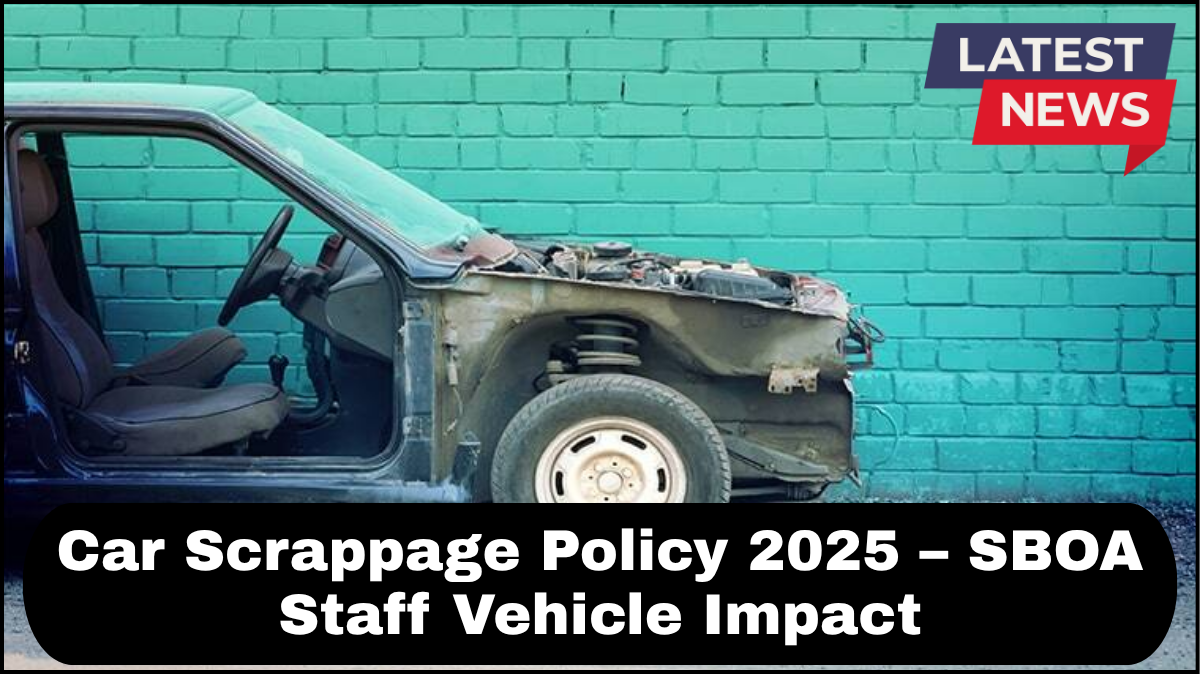The Car Scrappage Policy 2025 has stirred significant discussion across industries, and its implications for the State Bank Officers’ Association (SBOA) staff are especially noteworthy. With the policy aiming to phase out older vehicles to reduce environmental pollution, many bank employees are concerned about how their personal and staff-owned vehicles will be affected. This article dives into the Car Scrappage Policy effects on SBOA staff, highlighting key changes, concerns, and practical guidance.

What is the Car Scrappage Policy 2025?
The Indian government has introduced the Vehicle Scrappage Policy 2025 as a strategic move to improve road safety, reduce emissions, and boost the automobile sector. According to the policy:
- Private vehicles older than 20 years and commercial vehicles over 15 years must undergo a fitness test.
- Vehicles failing the test or found unfit to comply with emission norms will be mandatorily scrapped.
- Incentives will be offered to those who voluntarily scrap their old vehicles and purchase newer, cleaner models.
While the policy has nationwide implications, its ripple effects on organized employee groups like the SBOA are unique.
Car Scrappage Policy Effects on SBOA Staff
The SBOA staff vehicle impact under this policy is multifaceted, affecting financial planning, mobility options, and benefits tied to vehicle usage. Here’s how:
1. Increased Replacement Pressure
Many senior bank staff members rely on cars purchased over a decade ago, often maintained in good condition. Under the new policy, these vehicles might fail the fitness test due to stricter emission and safety norms, regardless of actual performance.
2. Financial Strain on Staff
Replacing a car is a significant financial decision. Although incentives like tax rebates, discounts on new vehicles, and potential waivers on registration fees are being discussed, they may not fully offset the cost of buying a new car. For bank staff affected by the car scrappage plan, this can disrupt household budgets.
3. Impact on Bank-Provided Vehicles
Some SBOA staff use cars provided under staff vehicle schemes or loans subsidized by the bank. If these vehicles are now deemed scrap-worthy, it puts pressure on both the individual and the bank to review and possibly reallocate such benefits.
4. Geographical Disparities
Bank staff working in rural or semi-urban branches often drive longer distances and rely on personal vehicles due to limited public transport. The forced scrapping of older vehicles could disproportionately affect their daily commute.
Opportunities Hidden in the Policy
While the Car Scrappage Policy 2025 might seem restrictive at first glance, there are potential benefits that SBOA staff can leverage:
- Modern, Safer Vehicles: Upgrading to newer vehicles means better fuel efficiency, improved safety features, and lower maintenance costs.
- Environmentally Conscious Choice: Transitioning to cleaner vehicles aligns with broader sustainability goals, which can positively reflect on public sector organizations.
- Loan Restructuring Opportunities: The policy might encourage banks, including those under SBOA, to offer targeted vehicle loan schemes with relaxed EMIs or lower interest rates to staff needing to replace cars.
Recommendations for SBOA Members
- Evaluate Your Vehicle’s Fitness: Before reacting to the policy, determine your car’s current compliance level. Not all older vehicles are immediate candidates for scrapping.
- Explore Bank Schemes: Check if the bank offers any internal car replacement or subsidy program aligned with the scrappage policy.
- Plan Ahead Financially: Consider new vehicle financing options early to avoid last-minute strain.
- Advocate Collectively: The SBOA can represent staff interests by negotiating specific relaxations or support mechanisms with regulatory bodies.
Frequently Asked Questions (FAQs)
Q1. Will all vehicles over 15-20 years be scrapped automatically?
No. Only vehicles that fail the mandatory fitness and emissions tests will be scrapped. Others can continue operation with proper certification.
Q2. Are there any exemptions for government or public sector employees?
As of now, the policy applies uniformly. However, associations like SBOA can lobby for sector-specific considerations.
Q3. What incentives are offered for scrapping an old car?
These include discounts on new vehicles, waivers on registration charges, and potential road tax reductions.
Q4. How can bank staff prepare for the change?
Start by checking your vehicle’s age and condition, reviewing bank financing options, and keeping track of SBOA’s advocacy efforts.
click here to learn more